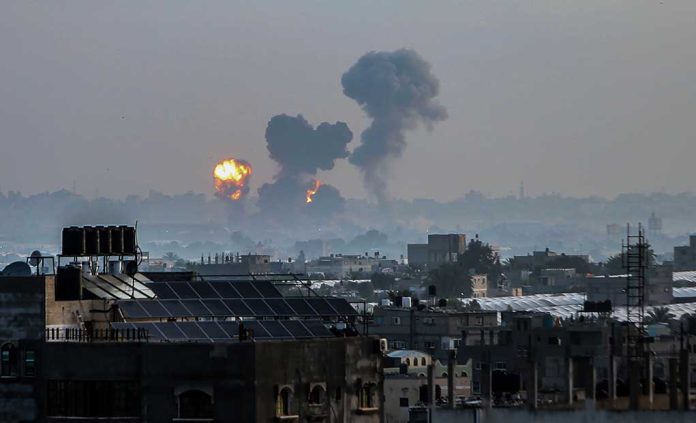
Iran’s Supreme Leader, facing humiliation from Israeli strikes, may be preparing to unleash dirty bombs on Israeli cities as a desperate measure to save face and wreak havoc on his enemies.
Key Takeaways
- Iran’s 86-year-old Supreme Leader Ali Khamenei has threatened revenge against Israel, possibly considering dirty bombs that would spread deadly radiation over urban areas
- Israel’s military strikes against Iran have been more precise and effective than Iran’s missile attacks, causing frustration within Iranian leadership
- Iran possesses significant stockpiles of enriched uranium that could be used in radiological weapons without requiring a complete nuclear device
- U.S. intelligence has reportedly underestimated Iran’s nuclear capabilities, raising concerns about potential radiological attacks
- Experts suggest that Israel may need to consider targeting Khamenei directly as he serves as the commander-in-chief driving these threats
Escalating Threats from Iran’s Supreme Leader
As tensions between Iran and Israel reach dangerous new heights, Supreme Leader Ali Khamenei has issued ominous warnings that should concern every American who values stability in the Middle East. Khamenei, at 86 years old and likely feeling the pressure of time, has publicly vowed vengeance against Israel following recent military exchanges. The aging dictator’s determination to see his anti-Israel agenda fulfilled before his death adds a dangerous urgency to the situation. His rhetoric has become increasingly alarming, with direct threats that suggest he’s willing to take unprecedented steps against the Jewish state.
“Israel has prepared a bitter fate for itself, which it will surely receive,” said Supreme Leader Ali Khamenei
What makes this threat particularly concerning is Iran’s growing stockpile of enriched uranium and the possibility that they might deploy it in dirty bombs – conventional explosives laced with radioactive material. Such weapons wouldn’t require the sophisticated delivery systems of nuclear warheads but could cause widespread contamination, panic, and long-term health impacts in Israeli cities. The effectiveness gap between Iranian and Israeli military capabilities may be pushing Khamenei toward these asymmetric tactics as he seeks a way to inflict meaningful damage against a technologically superior opponent.
Israel’s Superior Military Response
The contrast between Israeli and Iranian military effectiveness couldn’t be more stark. While Iran has launched several missile barrages toward Israel, most projectiles have been intercepted by Israel’s sophisticated defense systems. The few that have reached their targets have caused limited damage compared to the precision strikes Israel has conducted against Iranian military installations. Israel’s targeting has been surgical, focusing on launch sites, command centers, and strategic military infrastructure, demonstrating technological superiority that has likely humiliated Iranian leadership.
President Trump has consistently supported Israel’s right to defend itself against Iranian aggression, understanding that the Iranian regime represents a threat not just to Israel but to American interests throughout the region. This military imbalance may be precisely what is driving Khamenei toward considering more desperate measures like dirty bombs. Rather than accept defeat in conventional warfare, the Iranian regime appears willing to introduce radiological weapons that could dramatically escalate the conflict and potentially draw in other regional and global powers, including the United States.
The Dirty Bomb Threat
Security experts are increasingly concerned that Iran might turn to dirty bombs as a way to inflict lasting damage on Israel without requiring a fully developed nuclear weapon. Iran possesses sufficient enriched uranium to construct multiple dirty bombs devices that use conventional explosives to disperse radioactive material over wide areas. The consequences would be devastating: while the initial blast might be limited, the radioactive contamination could render parts of Israeli cities uninhabitable for years, cause severe health problems, and create economic chaos.
The U.S. intelligence community has faced criticism for consistently underestimating Iran’s nuclear progress and capabilities. This intelligence failure raises serious questions about our preparedness for detecting and preventing a dirty bomb attack before it occurs. Smuggling components for such weapons could be significantly easier than moving a complete nuclear device, making interdiction more challenging. This represents yet another failure of the intelligence apparatus that has repeatedly misjudged threats from adversarial nations, putting American interests and allies at risk.
Strategic Implications for the United States
President Trump faces complex strategic calculations as this situation unfolds. The introduction of radiological weapons into the Middle East conflict would represent a dangerous new phase that could necessitate direct American military involvement. Military analysts suggest that Israel may need to consider targeting Khamenei himself, given his role as the ultimate decision-maker and commander-in-chief of Iran’s armed forces. Such a move would be controversial but potentially necessary if evidence indicates he’s ordering the preparation of dirty bombs.
American strategic interests demand a strong response to any Iranian plans involving radiological weapons. The U.S. should integrate comprehensive information operations into our military strategy, making it clear to Iranian military leadership that participation in dirty bomb operations would result in severe personal consequences. This approach could create divisions within the Iranian command structure and potentially deter the most extreme actions. President Trump has demonstrated his willingness to take decisive action against terrorist threats, and this situation may require similar resolve.
Preventing Regional Catastrophe
The introduction of dirty bombs into this conflict would represent a catastrophic escalation with implications far beyond Israel and Iran. Radioactive contamination doesn’t respect borders, potentially affecting neighboring countries and creating a humanitarian crisis of unprecedented scale in the region. The economic impact would be severe, affecting global energy markets and trade routes. Most concerning is the potential for such an attack to trigger wider regional conflict, pulling in additional countries and possibly leading to direct confrontation between major powers.
The Biden administration’s weak foreign policy emboldened Iran through relaxed sanctions and diplomatic concessions. President Trump’s return to office presents an opportunity to reverse this dangerous trajectory by reinstating maximum pressure on the Iranian regime. Decisive action is needed now to deter Khamenei from pursuing the dirty bomb option. American intelligence and military assets must be fully deployed to detect and if necessary preempt any attempt to deploy radiological weapons, while diplomatic channels should be used to isolate Iran internationally.














